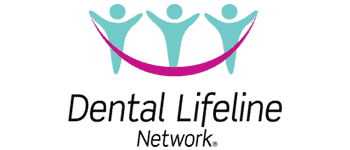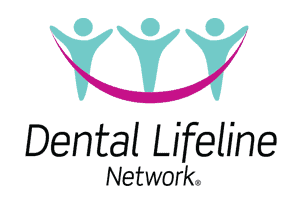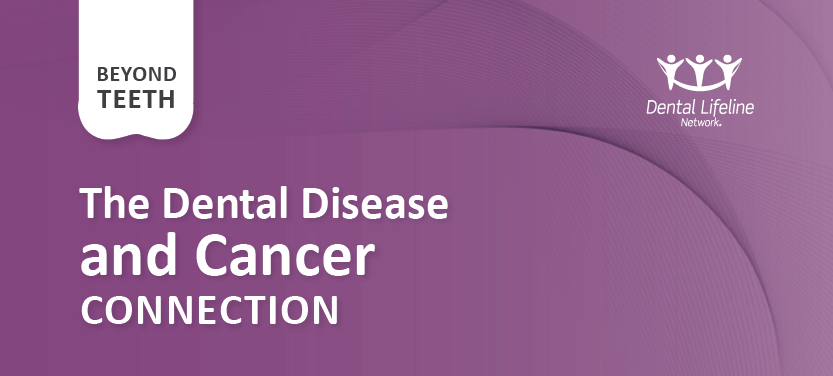Cancer
Dental diseases can complicate cancer treatment, and cancer treatments can create serious oral / dental problems. Because the mouth is very sensitive to cancer drugs and radiation, encourage your cancer team and dentist to consult as your treatment progresses.
Before Starting Cancer Treatment
- Schedule a dental exam. Cavities and gum diseases are bacterial infections. It is important they are identified and treated before starting cancer treatment since cancer drugs weaken our natural defenses against infections. That can let cavities and gum diseases get worse, and enable the harmful dental bacteria to spread throughout the body. Some cancer drugs also make it more difficult to control and stop bleeding. Since some dental procedures can cause bleeding, it is important to try completing any needed dental care before starting chemotherapy.
- Smooth jagged teeth and remove orthodontic bands. It’s important to eliminate anything that can irritate the cheeks and tongue and cause sores that can worsen and become infected during cancer treatment.
- Strengthen your teeth. Talk to your dentist about mouth rinses and fluoride supplements that can strengthen teeth against disease during treatment, especially if radiation is planned for head and neck cancers.
During Cancer Treatment
- Get routine dental check-ups to help prevent problems. Your dentist may recommend postponing treatment which isn’t essential.
- Maintaining oral hygiene is very important.
- Be gentle while brushing and flossing because your gums may be more sensitive and fragile.
- Use toothbrushes with the softest bristles, and soften them even more by rinsing them with hot water.
- When flossing, be gentle and “saw” floss carefully between the teeth. Don’t let the floss “snap” because that may damage fragile gums. Use fluoridated toothpaste to help strengthen teeth against decay.
- Certain cancer drugs can cause inflammation and sores to develop in your mouth. Consult your dentist and cancer team if that occurs. If severe, your cancer team may consider temporarily cutting back on dosing to help the areas heal.
- Pain-relieving gels such as Orabase may provide relief, as can mouth rinses that do not contain alcohol, such as Peroxyl. A homemade mouth wash (1/4th teaspoon each of salt and baking soda in a quart of warm water) may also be helpful. Following use, rinse with plain water.
- Use saliva substitute products to help with the unpleasant and potentially damaging effect of a dry mouth. Radiation for head and neck cancers, as well as some cancer drugs can reduce the amount of saliva we produce. That can increase dental problems since saliva protects against cavities and gum infections. Sucking on ice chips may provide relief as well as help to control discomfort created by sores in the mouth.
After Cancer Treatment
- Protect against dental problems. Ask your cancer team if you were treated, or may be treated, with drugs called bisphosphonates. They help protect bone from being weakened by certain cancers, including multiple myeloma and other blood cancers, as well as metastatic breast cancer. Talk to your dentist about what can be done to prevent dental infections since bisphosphonates can cause rare but serious jaw infections after oral surgery, even years after completing cancer treatment.
- Talk to your dentist about fluoride supplements to protect against cavities, especially if you’ve had radiation treatment for head and neck cancers.
- Use saliva substitute products if you have the lingering effects of a “dry mouth.” The loss of saliva can create havoc with your teeth.
Resources
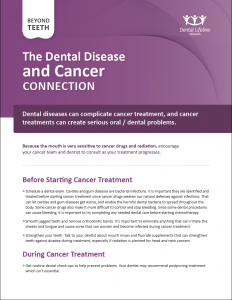
This information is a public service of the Dental Lifeline Network. The content is for educational purposes only. It should not be used as a substitute for the medical advice of one’s health care provider.
Your Input is Important
Please take a quick 2-3 minute survey to help us improve our communications about this important topic.
"*" indicates required fields
